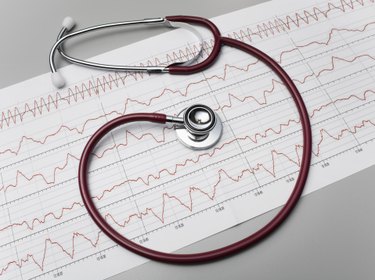
Heart rates are affected by a variety of factors. Higher-intensity activities increase heart rate while resting activities decrease heart rates. Your body has systems that regulate your body in response to intensity levels. The variations in heart rate enable your heart to beat at a rate to supply your body with sufficient blood to meet the intensity demand of each activity.
Function
Video of the Day
Heart rate is measured as the number of times that your heart beats in one minute. With each beat, blood, oxygen and nutrients are transported to your organs while removing waste products from trillions of cells in your body. Each day, the amount of blood circulated in the body of a healthy adult totals more than 2,100 gallons.
Video of the Day
Digestion is the process of breaking down food and chemically changing it to nutrients for absorption. The process converts food into energy.
Time Frame
A resting heart rate averages about 70 beats per minute. The rate increases with increased activity levels such as exercising or with emotional triggers such as fear and anger. During cardio training, heart rates reach training zones ranging from 120 to 175 beats per minute.
Digestion is broken down into two phases. After eating, it takes six to eight hours for food to pass through the stomach and small intestines. The entire digestion time varies between 24 to 72 hours.
Effects
The relationship between digestion and heart rate is regulated by your autonomic nervous system. The system functions to regulate internal organs and functions, including temperature, heart rate and blood pressure. The autonomic nervous system consists of two classifications, the parasympathetic and sympathetic systems.
The sympathetic system is known as the "fight or flight" response. This system works to stimulate or increase your heart rate in an emergency situation. The parasympathetic system is known as the "digest and rest" response. In order to save energy, your heart rate decreases so that digestion can occur.
Expert Insight
Digestion after larger meals will take extended lengths of time due to larger amounts of food. In response, heart rates may remain decreased for extended periods of time. This can result in lowered metabolic rates, which could lead to weight gain.
In older individuals, heart rates may increase with digestion in response to decreased blood pressure in reaction to the amount of blood diverted to organs involved in digestion.
Considerations
Heart rates should be monitored periodically for comparisons. Changes in heart rates may be indicative of potential health problems. Consult a physician if there are significant changes in heart rate during the same type of activity or at rest.